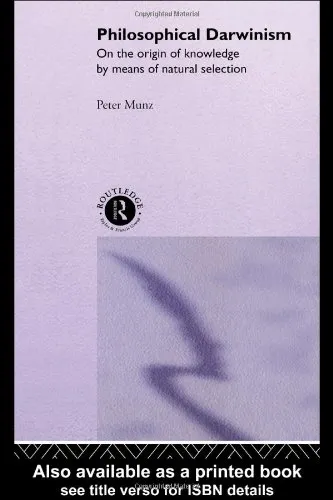Philosophical Darwinism - On the Origin of Knowledge by Means of Natural Selection
4.0
Reviews from our users

You Can Ask your questions from this book's AI after Login
Each download or ask from book AI costs 2 points. To earn more free points, please visit the Points Guide Page and complete some valuable actions.Related Refrences:
Welcome to the enlightening world of 'Philosophical Darwinism - On the Origin of Knowledge by Means of Natural Selection', a profound exploration of how evolutionary theory can extend beyond biology to offer insights into the development and transmission of human knowledge. As we dive into this groundbreaking work, we unravel the intersections of philosophy, epistemology, and Darwinian evolution to engage with fundamental questions about the nature of knowledge itself.
Detailed Summary of the Book
'Philosophical Darwinism' presents an innovative discourse that repositions Charles Darwin's theories within the realm of epistemology. Through meticulous argumentation, the book asserts that knowledge, much like biological traits, evolves through a natural selection process. It proposes a paradigm where human understanding and intelligence are products of an evolutionary journey, shaped by adaptation to our environment. The book elucidates how memes, akin to genes, propagate through cultures, shaping collective cognition and societal evolution.
The narrative traverses numerous intellectual landscapes, incorporating insights from science, history, and philosophy. Peter Munz argues against the notion of static knowledge, emphasizing the dynamic and ever-changing nature of human understanding. By treating knowledge as an evolutionary phenomenon, the book delves into how societies accumulate wisdom, discard obsolete ideas, and adapt to existential challenges.
Munz eloquently discusses how the application of Darwinian principles can demystify complex philosophical queries. From the development of language to the propagation of scientific ideas, the work intricately links diverse cognitive phenomena to evolutionary mechanisms. This philosophical journey not only questions but also expands the boundaries of traditional epistemology.
Key Takeaways
- Knowledge, like biological species, undergoes a process of selection and evolution.
- Human cognition is not the sole domain of conscious reasoning but is deeply rooted in evolutionary history.
- Cultural and intellectual progress mirrors the biological survival of the fittest, with ideas competing for dominance.
- The evolution of language, culture, and science can be better understood through Darwinian frameworks.
- Munz challenges traditional epistemological views by positioning knowledge as a dynamic, evolving entity.
Famous Quotes from the Book
“Just as living organisms adapt to their physical environment, human knowledge evolves to fit our cognitive landscape.”
“Ideas must compete for survival in a conceptual arena where only the fittest endure.”
Why This Book Matters
'Philosophical Darwinism' is a seminal contribution to the dialogue between science and philosophy. By applying Darwinian principles to the realm of knowledge, it invites us to reconsider how we perceive the growth and adaptation of human understanding. This book matters not only for its interdisciplinary approach but also for its potential to inspire new ways of thinking about knowledge, culture, and human intellectual evolution. Peter Munz offers a compelling vision that encourages readers to embrace the fluidity of knowledge and the continuous nature of intellectual discovery.
Free Direct Download
You Can Download this book after Login
Accessing books through legal platforms and public libraries not only supports the rights of authors and publishers but also contributes to the sustainability of reading culture. Before downloading, please take a moment to consider these options.
Find this book on other platforms:
WorldCat helps you find books in libraries worldwide.
See ratings, reviews, and discussions on Goodreads.
Find and buy rare or used books on AbeBooks.
1221
بازدید4.0
امتیاز50
نظر98%
رضایتReviews:
4.0
Based on 0 users review
"کیفیت چاپ عالی بود، خیلی راضیام"



